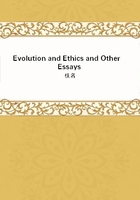
第20章
I think it must be obvious to every one, that, whether we consider the internal or the external interests of society, it is desirable they should be in the hands of those who are endowed with the largest share of energy, of industry, of intellectual capacity, of tenacity of purpose, while they are not devoid of sympathetic humanity; and, in so far as the struggle for the means of enjoyment tends to place such men in possession of wealth and influence, it is a process which tends to the good of society. But the process, as we have seen, has no real resemblance to that which adapts living beings to current conditions in the state of nature; nor any to the artificial selection of the horticulturist.
To return, once more, to the parallel of horticulture. In the modern world, the gardening of men by themselves is practically restricted to the performance, not of selection, but of that other function of the gardener, the creation of conditions more favourable than those of the state of nature; to the end of facilitating the free expansion of the innate faculties of the citizen, so far as it is consistent with the general good. And the business of the moral and political philosopher appears to me to be the ascertainment, by the same method of observation, experiment, and ratiocination, as is practised in other kinds of scientific work, of the course of conduct which will best conduce to that end.
But, supposing this course of conduct to be scientifically determined and carefully followed out, it cannot put an end to the struggle for existence in the state of nature; and it will not so much as tend, in any way, to the adaptation of man to that state. Even should the whole human race be absorbed in one vast polity, within which "absolute political justice" reigns, the struggle for existence with the state of nature outside it, and the tendency to the return to the struggle within, in consequence of over-multiplication, will remain; and, unless men's inheritance from the ancestors who fought a good fight in the state of nature, their dose of original sin, is rooted out by some method at present unrevealed, at any rate to disbelievers in supernaturalism, every child born into the world will still bring with him the instinct of unlimited self-assertion. He will have to learn the lesson of self-restraint and renunciation. But the practice of self-restraint and renunciation is not happiness, though it may be something much better.
That man, as a "political animal," is susceptible of a vast amount of improvement, by education, by instruction, and by the application of his intelligence to the adaptation of the conditions of life to his higher needs, I entertain not the slightest doubt. But so long as he remains liable to error, intellectual or moral; so long as he is compelled to be perpetually on guard against the cosmic forces, whose ends are not his ends, without and within himself; so long as he is haunted by inexpugnable memories and hopeless aspirations; so long as the recognition of his intellectual limitations forces him to acknowledge his incapacity to penetrate the mystery of existence; the prospect of attaining untroubled happiness, or of a state which can, even remotely, deserve the title of perfection, appears to me to be as misleading an illusion as ever was dangled before the eyes of poor humanity. And there have been many of them.
That which lies before the human race is a constant struggle to maintain and improve, in opposition to the State of Nature, the State of Art of an organized polity; in which, and by which, man may develop a worthy civilization, capable of maintaining and constantly improving itself, until the evolution of our globe shall have entered so far upon its downward course that the cosmic process resumes its sway; and, once more, the State of Nature prevails over the surface of our planet.